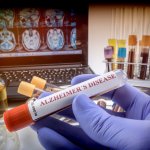
© Production Perig – stock.adobe.com
Article • Blood-based biomarkers under scrutiny
BBB testing for universal Alzheimer’s screening? It’s complicated
Laboratory tests using blood-based biomarkers (BBB) to identify the presence or risk of Alzheimer's disease (AD) in the brain are proliferating, offering the unprecedented opportunity for global population screening. Do these tests represent the next type of universally recommended screening tests, like pap smears for cervical cancer or feces analysis test kits for colon cancer? Experts curb the high expectations for this type of diagnostic tool.
Report: Cynthia E. Keen
They argue that it is going to take years before AD BBB tests become a mainstream health-wellness test commodity, designed to identify people at risk a decade or more before they develop AD cognitive decline.
Clinical hurdles that need to be addressed include:
- population-representative clinical validation trials
- a significant amount of clinical research to understand and quantify the impact of other diseases, medications, and combinations thereof on levels of brain AD biomarkers
- establishment of validated cutoffs and reference levels for all races and ethnicities
- extensive training of medical professionals, particularly primary care physicians, physician assistants, and nurse-practitioners, in the accurate interpretation of test results, in the counselling of patients at risk, and in patient monitoring and support protocols.
Ethical issues abound, including the question of whether a patient and/or family will benefit from knowing the test results or will be hurt by them. Government legislation is needed to protect a testee from discriminatory action that could be life-damaging.
Limited diagnostic significance
Current BBB tests that identify the presence and level of Amyloid-beta plaques and tau tangles in the brain which are symptomatic of AD are not definitive diagnoses of the disease. They are not recommended as standalone diagnostic tools. Rather, they are intended to supplement a clinical diagnosis made by a physician of patients presenting with symptomatic or subjective cognitive decline. They may be a precursor to an invasive lumbar puncture test of cerebrospinal fluid (CFS) or an expensive PET scan. BBB tests also qualify AD diagnosed patients with early-stage cognitive decline for regulatory-approved disease modifying therapies (DMT) or clinical trials.
Recommended article

Article • Detection of neurodegenerative condition
Developing blood biomarkers to diagnose Alzheimer’s disease
There is no known cure for Alzheimer’s disease (AD), although prescription drug-based treatments that can slow AD progression in some patients are starting to enter clinical use. Biomarkers, quantifiable characteristics of biological processes or pathological conditions of the body, are making it possible to help identify and measure the presence and extent of AD and its degenerative…
Many BBB clinical trials testing for AD have used patient cohorts who were predominantly non-Hispanic Caucasians. As an example, the TRAILBLAZER-ALZ 2 study of donanemab, an FDA-cleared drug which significantly slowed clinical progression of AD in individuals with low/medium tau, included only 5.8% Hispanic, 4.1%, Black and 1.0% Asian patients in its 1,736 patient cohort.1
What this means for both symptomatic and asymptomatic people of colour is that the specific findings of this clinical trial may not be as applicable to them. Until more inclusionary trials are completed, there is no way of definitively knowing.
Challenges of non-specialist physician interpretation and follow-up
Prof. Michelle M. Mielke, PhD, of the Department of Epidemiology and Prevention of Wake Forest University School of Medicine in Winston-Salem, NC, is the co-lead of a BBB Workgroup of the Global CEO Initiative on Alzheimer’s Disease, tasked with providing actionable recommendations on implementing BBBs in primary and secondary care settings in the United States. She and her colleagues express concern about the ability and confidence level of health care professionals who are not a dementia specialist interpreting BBB test results.2,3
Physicians must be able to consider positive and negative predictive values of a test with validated reference standards. But this may not be as easy as it seems, especially if BBB tests adopt a two-cut-off approach. What should a physician do if a patient’s test results fall between the two?
Chronic kidney disease, stroke, obesity and cardiac disease have been found to influence AD BBBs. Prof. Mielke and colleagues point out that failure to consider the impact of any of these comorbidities when interpreting BBB levels may result in misdiagnosis. Additionally, no established guidelines exist for interpreting BBB tests in patients with multiple chronic conditions.
Recommended article

Article • Promising, but in need of further validation
Implementation challenges of blood biomarkers for Alzheimer’s disease
Blood-based biomarker (BBB) tests may represent the best weapon to combat the soaring rates of Alzheimer’s disease (AD) throughout the world. Existing clinically validated tests are currently deployed to facilitate diagnosis, to monitor disease and effectiveness of treatments, to quantify progression, and to determine if a patient is appropriate for treatment or participation in a clinical…
Another factor to consider are medications which might impact test results. A clinical study conducted at the Institute of Neuroscience and Physiology of the Sahlgrenska Academy at the University of Gothenburg, in Mölndal, Sweden, revealed that a prescription drug used for treating heart failure increased plasma Amyloid-beta concentrations by approximately 30%, while another drug for the same purpose had no impact.4
Global resources are seriously constrained treating patients with cognitive decline, wither AD or other types of dementia. What health professional resources will be needed for patients exhibiting early cognitive decline but are functional if BBB testing for AD is positive? What types of assistance are needed? Do protocols exist to follow this patient? What if the patient does not have access or resources to receive and pay for AD disease modifying therapies? Will stress generate other medical conditions that require treatment?
Benefit to patient?
An essential question for a physician to consider is the benefit a BBB AD test will have for a patient, or not. Would a patient in their 60’s with no symptoms of cognitive impairment but with a family history of AD benefit? Because the AD pathologies of Amyloid-beta and tau accumulate in the brain years before AD symptoms manifest themselves, and because some individuals will never develop cognitive decline in spite of significant AD pathology accumulations, would a test be more harmful emotionally than beneficial as a warning of a possible debilitative illness?
Until there is evidence that biomarker testing improves the outcomes of cognitively unimpaired patients, biomarker testing of these individuals outside of research studies or clinical trials likely has more risks than benefits
Lawren VandeVrede
Would it be better for patients at presumed high risk be more motivated to make lifestyle changes to deal with sleep disorders or medical conditions that are associated with AD development, instead of having the test?
Would positive test results lead to discrimination impacting quality of life? Would a still cognitive individual have a driver’s license revoked or denied? Would an application for a life insurance policy be rejected or would premiums of an existing one increase? And in countries like the United States with an independent health insurance payor model, would premiums soar as to become prohibitive? Legislation could prevent these scenarios from happening, but have any governments implemented legal protections?
Lawren VandeVrede, MD, PhD, an Assistant Professor of Neurology at the Memory and Aging Center of the University of California-San Francisco, and a core team member of Prof. Mielke’s group, is deeply concerned about the questions. He writes, ‘Until there is evidence that biomarker testing improves the outcomes of cognitively unimpaired patients, biomarker testing of these individuals outside of research studies or clinical trials likely has more risks than benefits.’5
Profiles:
Michelle M. Mielke, PhD, is Professor of Epidemiology and Prevention and Professor of Gerontology and Geriatric Medicine at Wake Forest University School of Medicine in Winston-Salem, NC. In addition, she is Chair of the Department of Epidemiology and Prevention. She works as a translational epidemiologist to identify fluid and neuroimaging biomarkers for the diagnosis, prediction and/or progression of neurodegenerative diseases. Dr Mielke is a co-leader of BBB Workgroup 2 of the Global CEO Initiative on Alzheimer’s Disease, which is tasked with providing actionable recommendations on implementing BBBs in primary and secondary care settings in the United States.
Lawren VandeVrede, MD, PhD, is an Assistant Professor of Neurology at the University of California-UCSF and is a researcher and clinician at its Memory and Aging Center at the Weill Institute for Neurosciences. His clinical and research interests are in advancing the care of patients with neurodegenerative disorders, either through development of novel therapeutics or increasing understanding of the disease process. Dr. VandeVrede serves on the core team of the Global CEO Initiative on Alzheimer’s Disease BBB Workgroup.
References:
- Sims JR, Zimmer JA, Evans CD, et al. Donanemab in Early Symptomatic Alzheimer Disease: The TRAILBLAZER-ALZ 2 Randomized Clinical Trial. JAMA. 2023;330(6):512-527. doi: 10.1001/jama.2023.13239.
- Mielke MM, Fowler NR. Alzheimer disease blood biomarkers: considerations for population-level use. Nat Rev Neurol. 2024;20(8):495-504. doi: 10.1038/s41582-024-00989-1.
- Mielke MM, Anderson, Ashford JW, et al. Considerations for widespread implementation of blood-based biomarkers of Alzheimer’s disease. Alzheimers Dement. 2024;20(11):8209-8215. doi: 10.1002/alz.14150
- Schöll M, Verberk IMW, del Campo M, et al. Biomarkers of Neurodegeneration 2: Challenges in the practical implementation of blood biomarkers for Alzheimer’s disease. Lancet Healthy Longev. 2024:S:100630. doi.org/10.1016/j.lanhl.2024.07.013.
- VandeVrede L, Schindler SE. Clinical use of biomarkers in the era of Alzheimer’s disease treatments. Alzheimers Dement. 2025;21(1):e14201. doi: 10.1002/alz.14201.
05.08.2025





